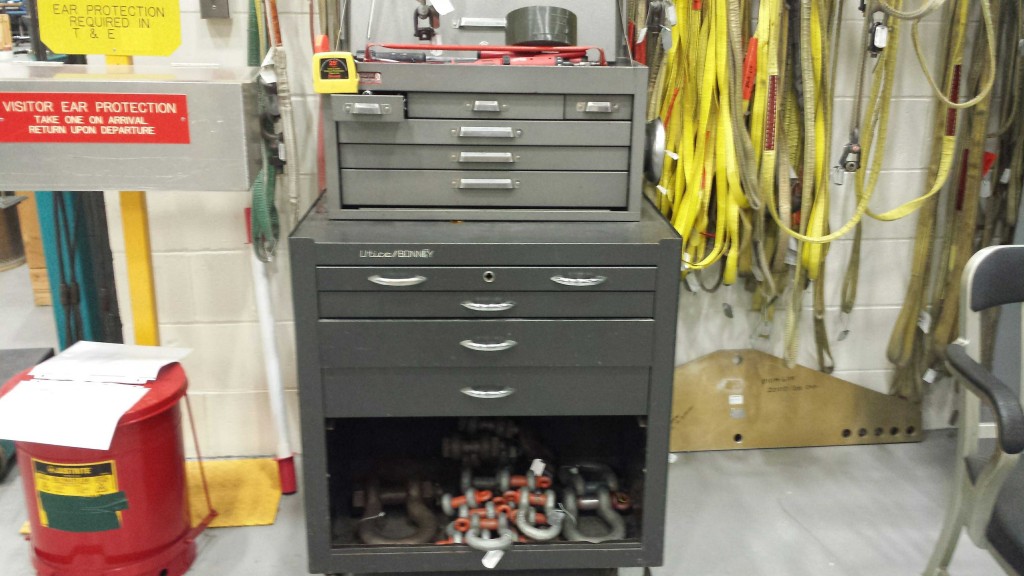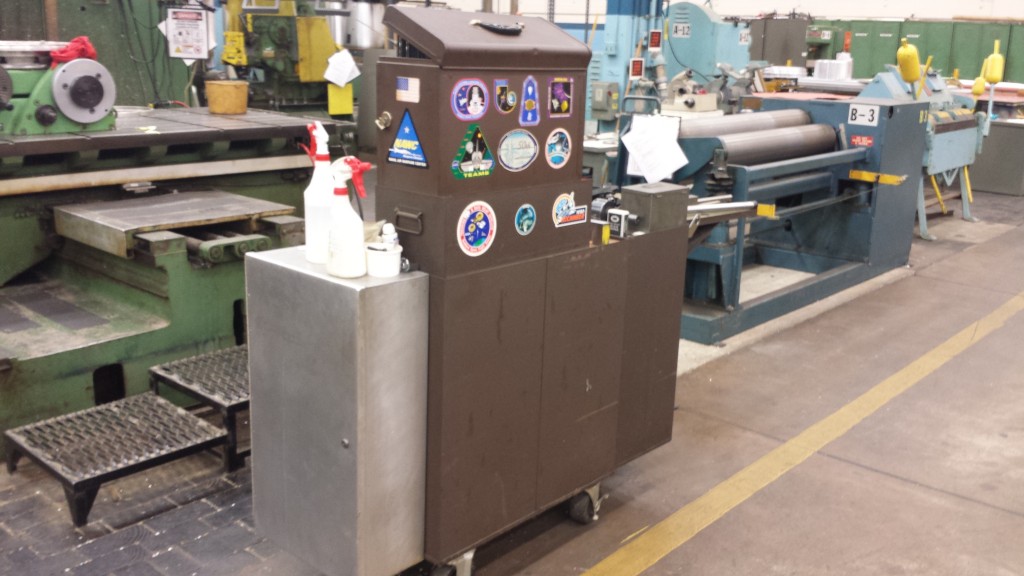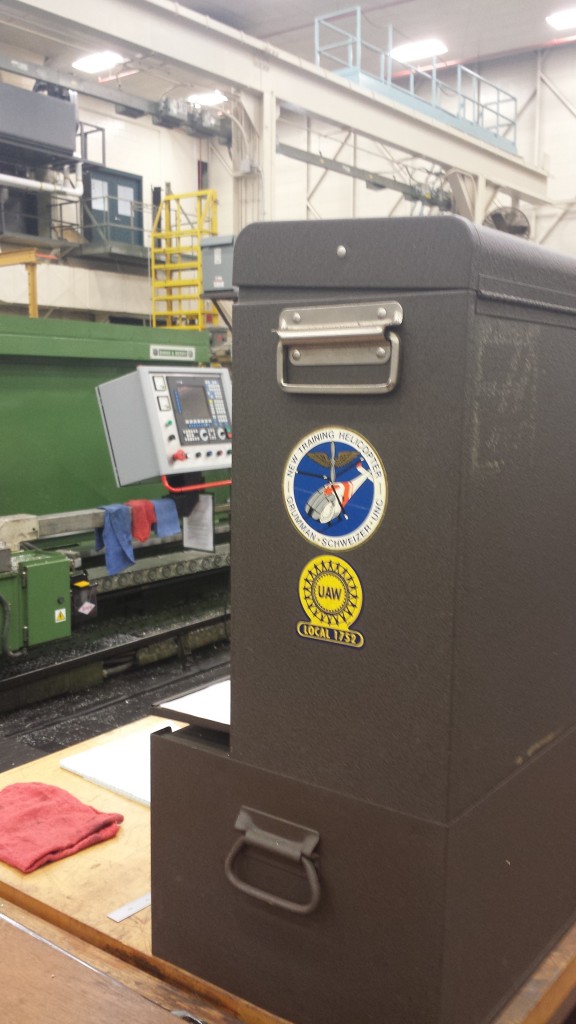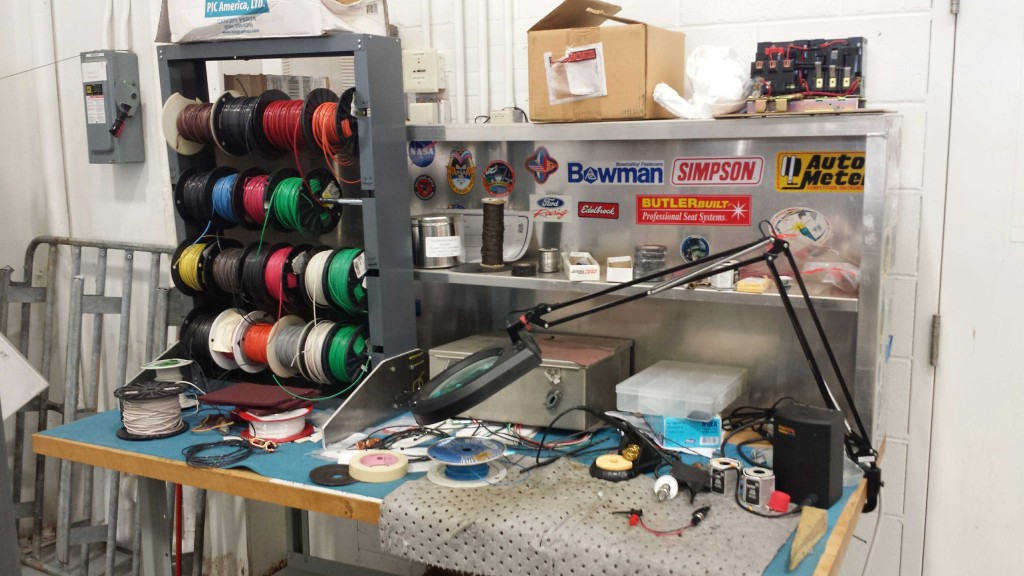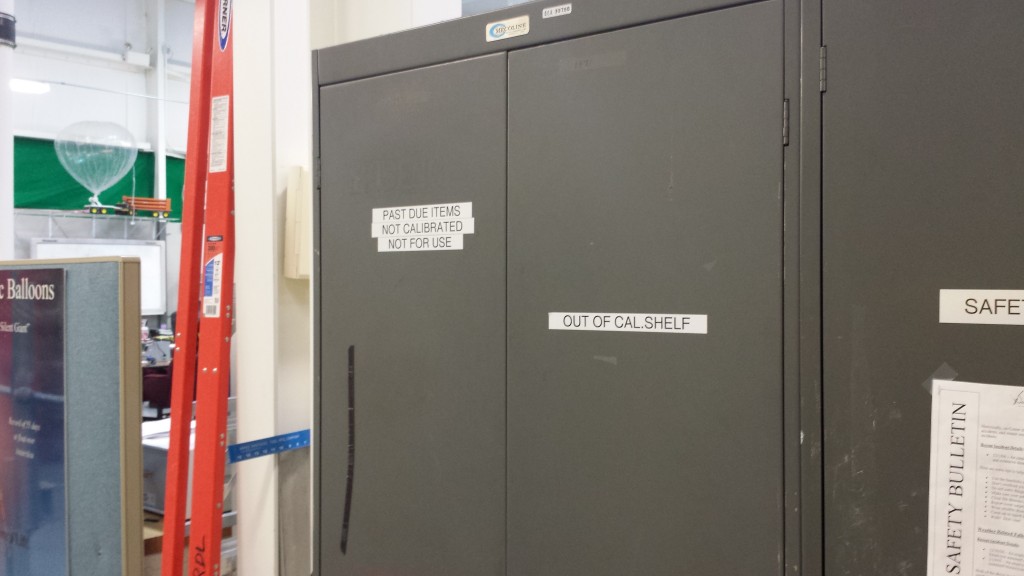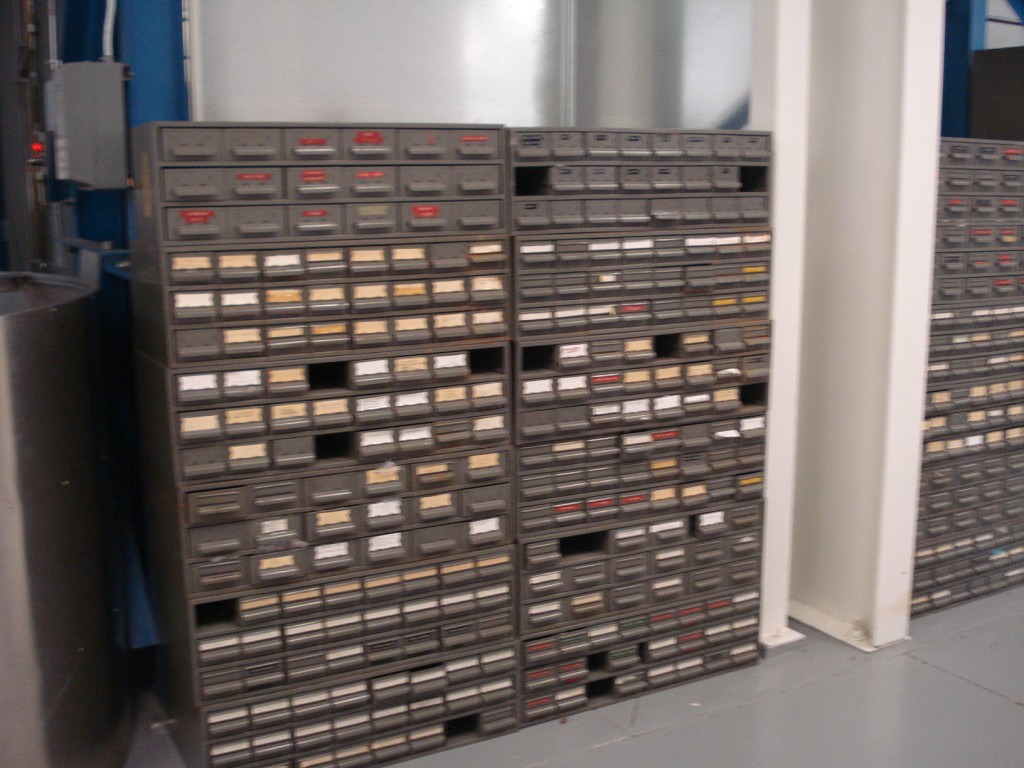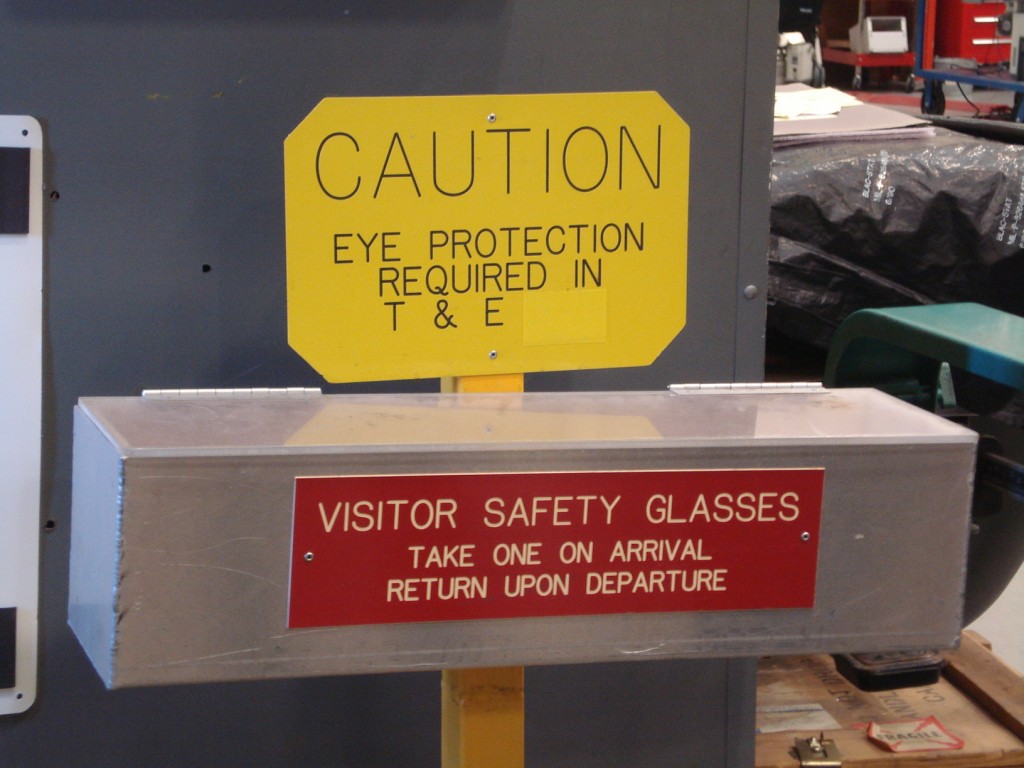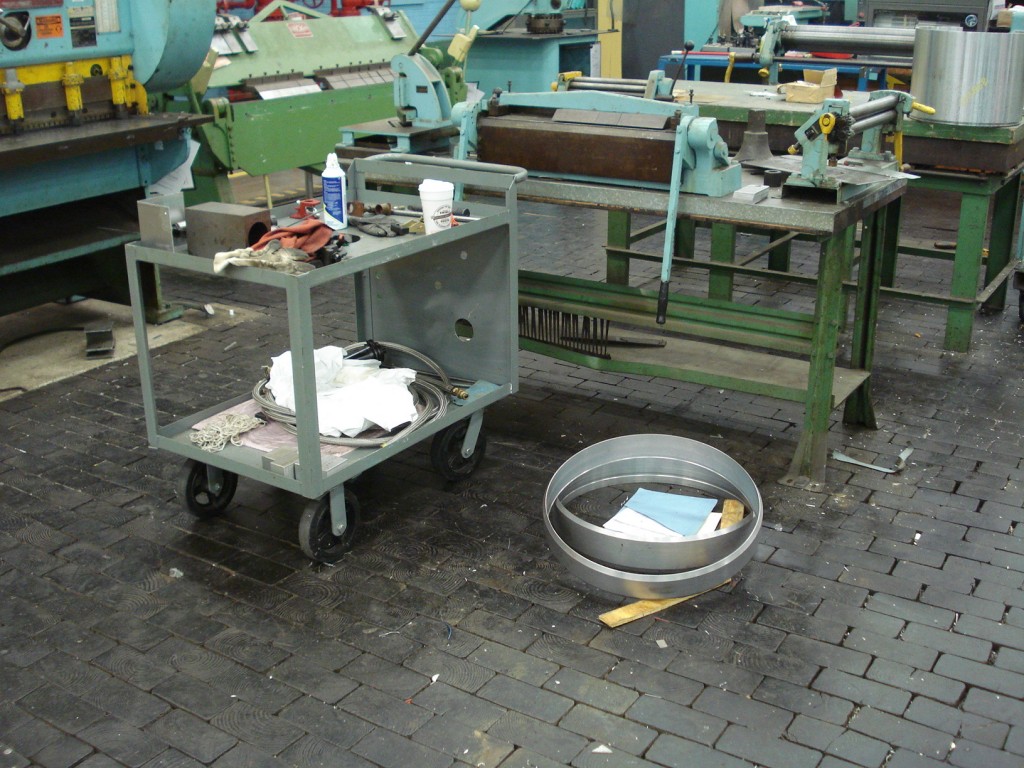After the previous loss, you know this launch’s success has to feel good for the entire Wallops team:
You can read more from Space.com here.
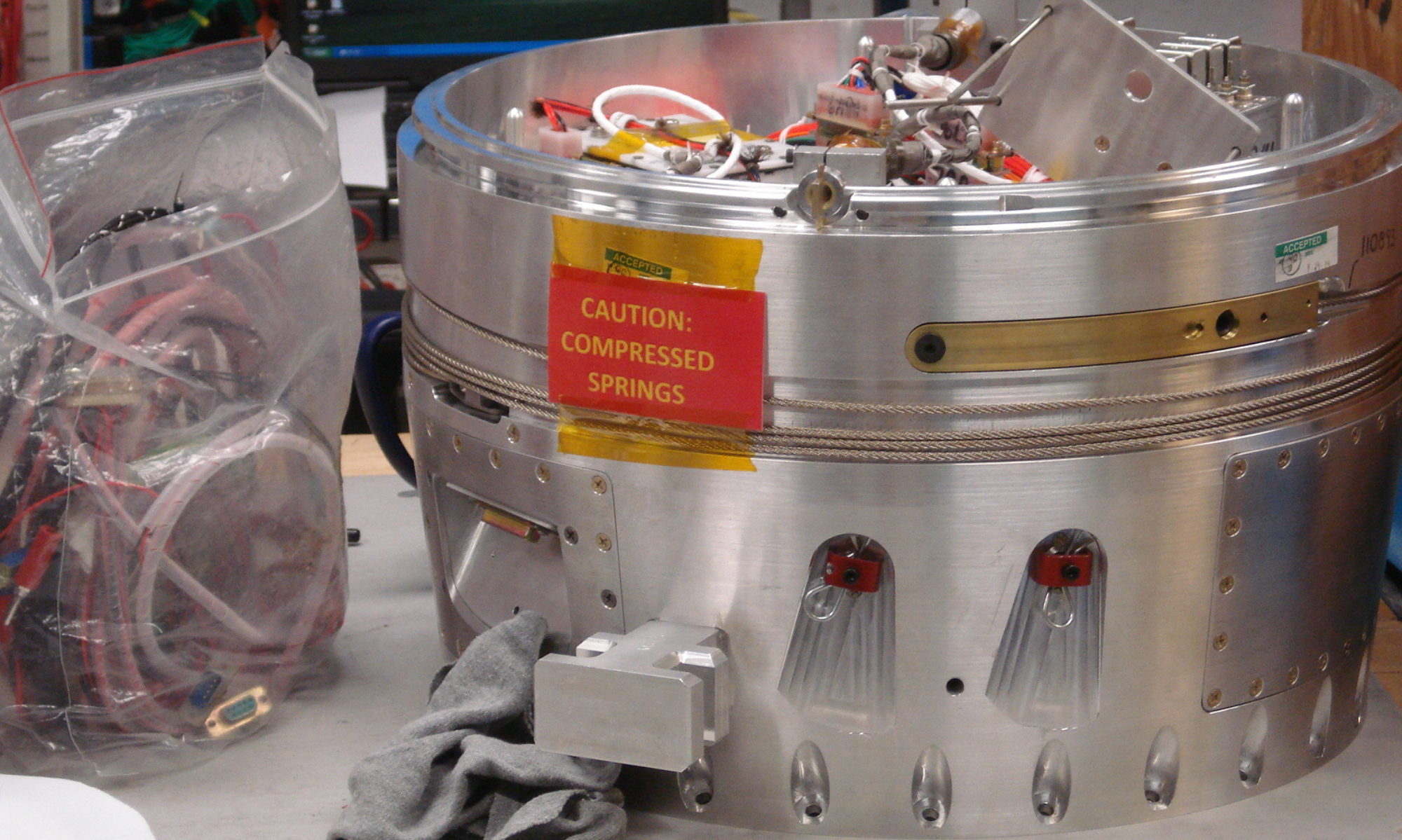
W4TI- Whiskey Four Tall Indians
Amateur Radio in Atlanta
After the previous loss, you know this launch’s success has to feel good for the entire Wallops team:
You can read more from Space.com here.
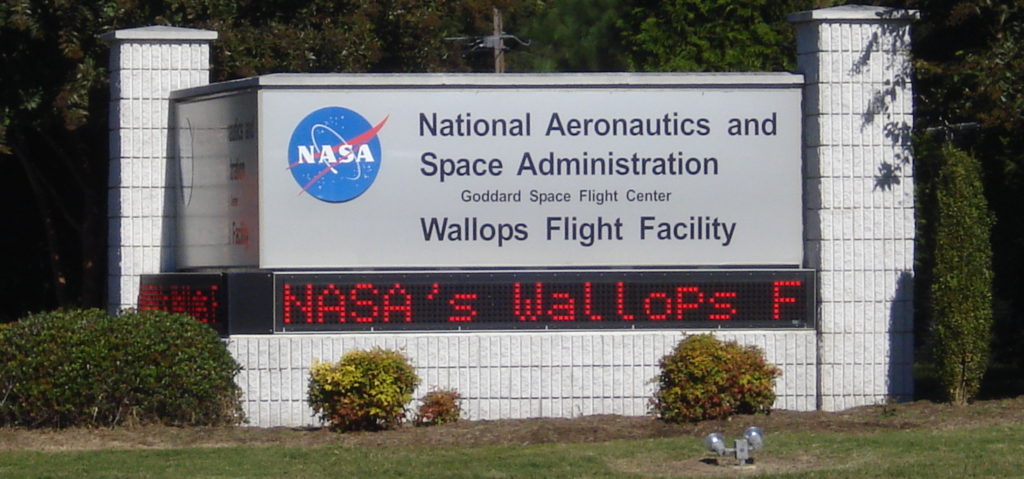
For those unfamiliar, NASA has a non-traditional media program that invites various social media users for a vast multitude of events- rocket launches being the primary interest of many, though there have been other events as well- notably getting to watch a rocket’s “hot” or test fire in the desert of Utah. I applied to view a launch in Virginia thinking I had no chance whatsoever of being selected. I don’t have a high post count here, nor do I engage with social media sites very much. However, the fates went my way and I got invited to be a social media commentator for the first Antares night launch from the Wallops Flight Facility, which is operated by the Goddard Space Flight Center, near the end of October 2014.
The flight from Atlanta to Norfolk takes about 2 hours. I took a night flight into ORF. As the plane began its decent, we turned around and could see the black mass of the ocean on one side and the incredible lighted area of Chesapeake Bay and the Norfolk Naval Station, home to the Atlantic Fleet. I could see the serpentine Chesapeake Bay Bridge, the absence of certain parts indicating which sections were undersea tunnels so that the fleet can come and go as it pleases.
After staying the night in Norfolk, I made the drive up to Wallops from Norfolk using the Bay Bridge. The trip up was uneventful and mainly as expected- the highway along the coastline was dotted with many businesses which had already shuttered as the summer season was over and so, too, were the opportunities to make money from the tourists.
Along the way, I stopped at a Wal-Mart, conveniently placed to take advantage of the coastal traffic, to get some snacks because I wasn’t sure what sorts of provisions would be available for the remainder of the day, and picked up my first bag of Utz Crab Chips, which I found to be quite wonderful.
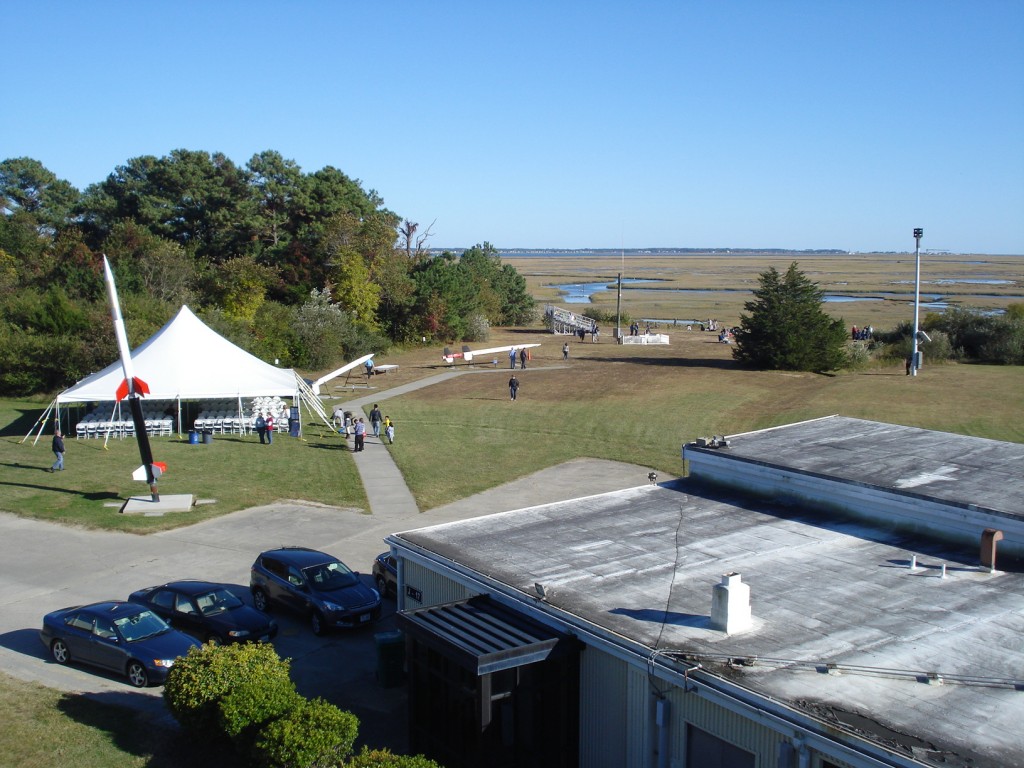
After arriving at the Wallops Visitor Center, which was to be the waypoint between the tours and activities among the facilities, all of the #NASAsocial invitees gathered together for sign-in and welcoming. Jason Townsend was our lead for the entire event, and was assisted by various team members. After what seemed like a whirlwind of meeting folks and getting somewhat oriented, it was time for the pre-launch meeting and press question and answer session, which was going to be broadcast on NASA TV. Just by the nature of these events, which are not reliant on national news media or other similarly sized and resourced organizations, the crowd was enough to fill the viewing room of the visitor’s center and the show, as they say, got on the road. It was light chatter, with some interesting characters from much larger NASA/Space watching sorts of blogs taking up the first couple of rows- while I did wonder if the folks doing the reporting for their blogs actually made any money at it, I was also simultaneously struck by the vulgarity of such a thought.
After our press briefing, which was close to an hour in length, we all piled up into busses to take a trip out to launch area, which has been photographed by NASA HQ, and you can view the photos here. They are really much better than the photos I collected, though I was pleased with this particular snap:
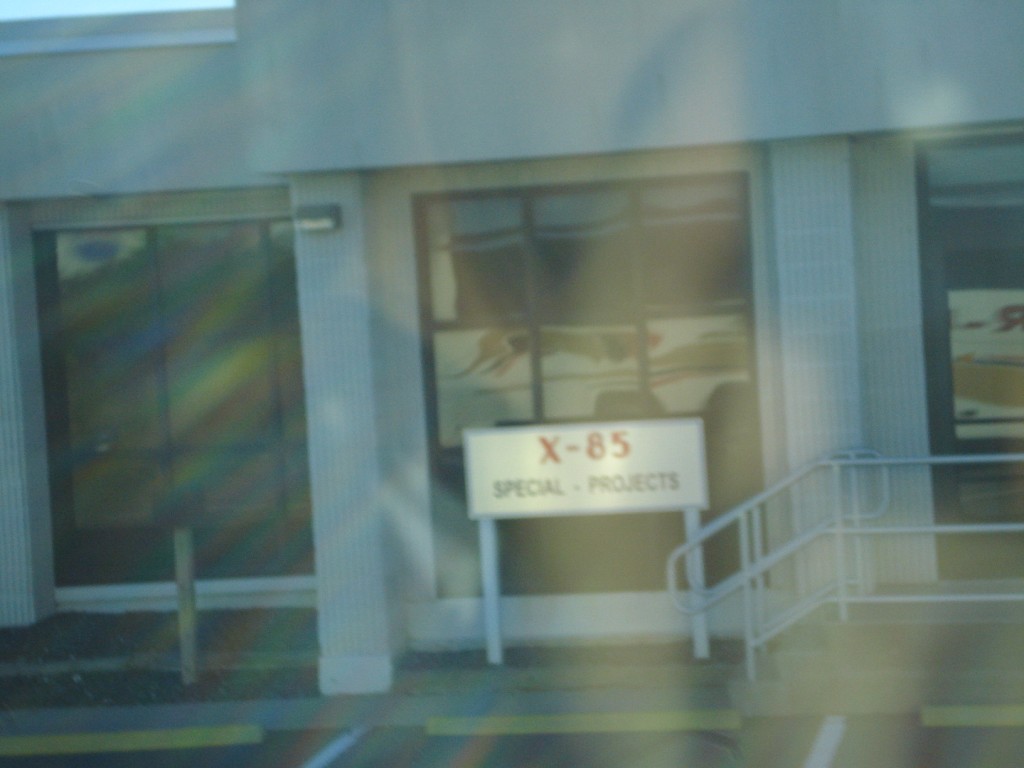
It was a pretty uneventful showing- the wind was blowing quite a bit and there was a bit of a chill coming in the air. The people we met from Orbital and that were in charge of the Antares launch of the “Orb 3” Mission were polite, cordial, and were somewhat alarmed when I asked whether the reorganization of Alliant Techsystems into the new Orbital Sciences Corporation was going to have any bearing on future launches in terms of cost savings, earnings per share, and other sorts of business metrics. They immediately had one of their very professional PR people come over and speak to me directly, as they probably didn’t want to get off message, in addition to trying to get a handle on who this particular rube was and why was he asking these sorts of questions.
I read the papers and just happened to be well informed, is all. This did eventually lead to a discussion the next day with a rocket motor guy and the history of Thiokol, DuPont reloading powders, and hunting in his home state of Utah. I think we get an idea that these people who are in charge of these various systems of the world at large are somehow separate and distinct from the rest of us; and that just isn’t true. Everyone I met from ATK/Orbital and from NASA were incredibly professional- but also approachable.
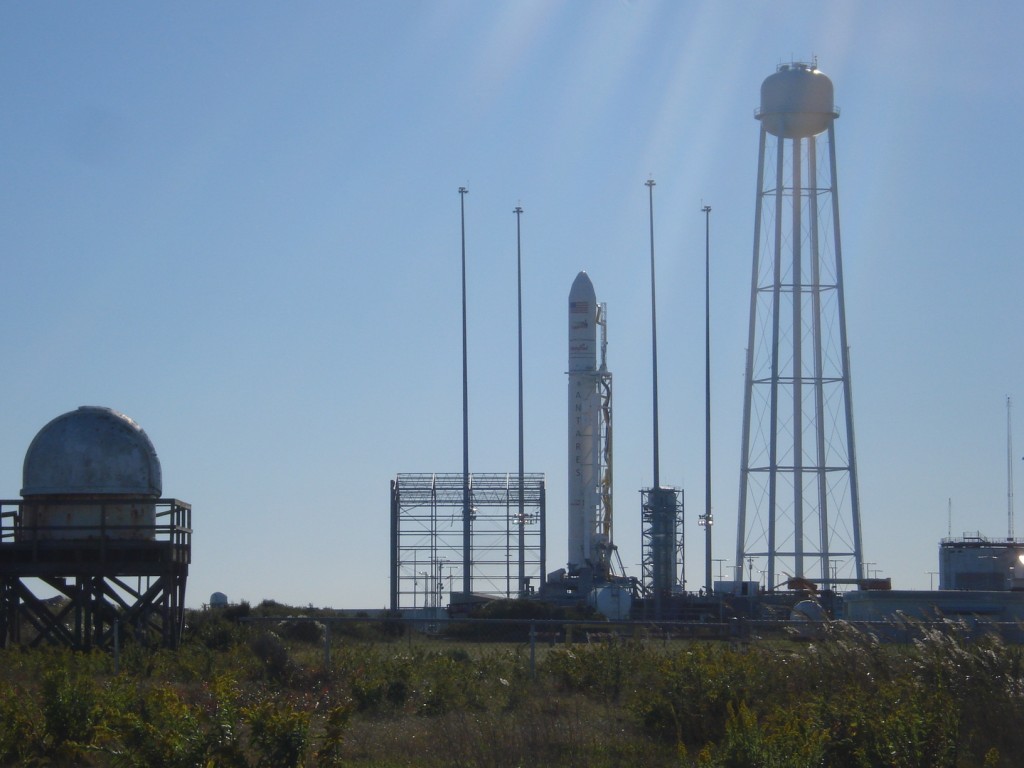
After the “close as we can let people who don’t have security clearances get to the launch pad to take photos and ask questions,” we got back onto the busses and headed back to the visitor center to disperse for the evening.
Across the street was a NOAA installation, noted by the large antennas- a favorite view of mine, I have to say!
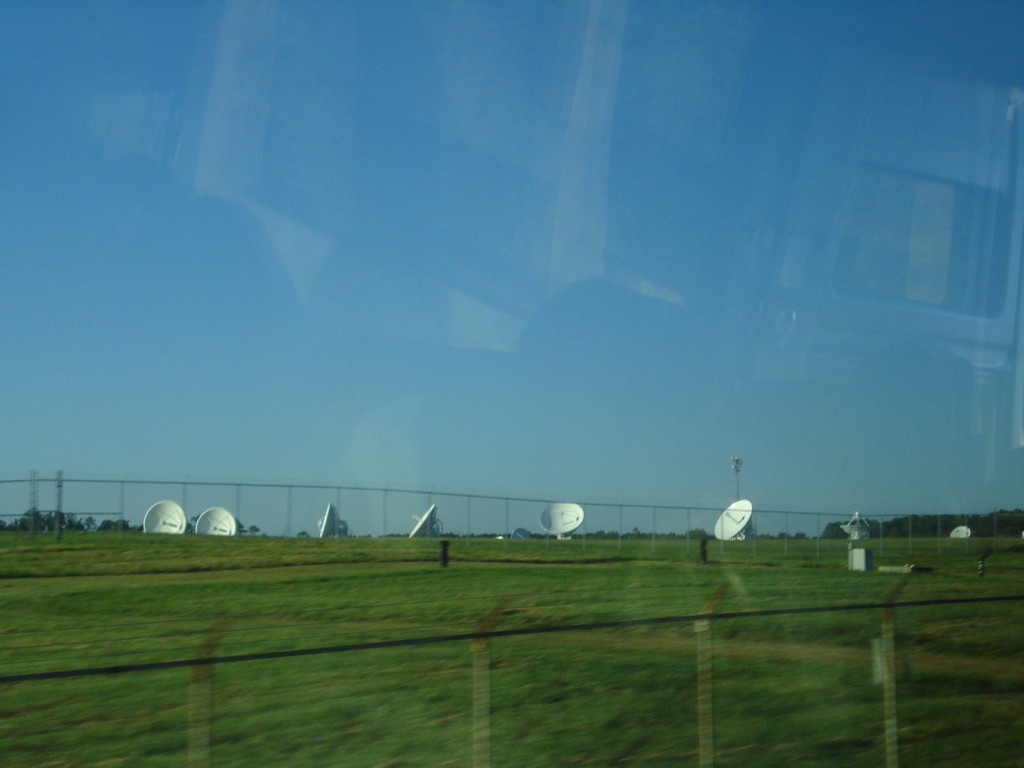
The stay on Chincoteague was pleasant enough. I ate at Famous Pizza; I skipped the pizza and had a flounder sandwich with cocktail sauce- delish! They had Tool playing in the kitchen, so I knew I was at the right place.
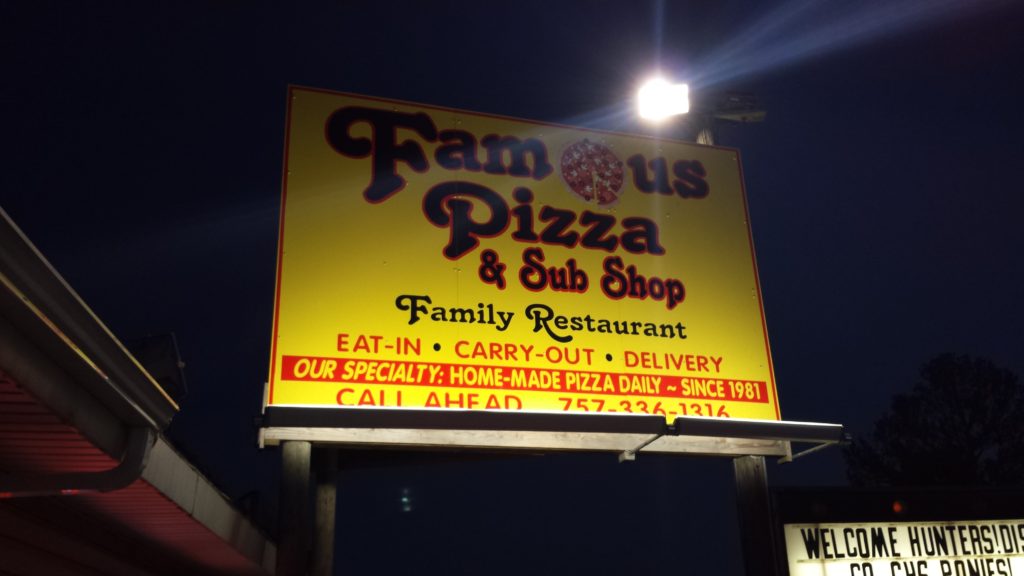
The hotel left a bit to be desired- I couldn’t quite figure out why there were so many black flies swarming about in the room, until I looked it up. How anyone visits such a place as a summer retreat with so many flies is beyond me- I’m used to the low bug count of the Redneck Riviera, I suppose. That is my only complaint, but the place is covered in flies and it is in a marshland, so not sure how germane the comment is.
I got up for the day’s events- it was a real marathon- we basically ran from place to place on the installation to visit the different facilities and hoping to maintain our schedule. I could have spent a week in each department we visited. Instead, #NASASocial only got about an hour or so per place- not including bus transport between different facilities- and it just wasn’t long enough. I only later learned that there were supposed to be 50 attendees, but due to the launch being rescheduled, we only retained 20 or so of the 50 (moved from Fri/Sat to Sun/Mon).
I can’t imagine what it would have been like with a full compliment of NASASocialites. I think our group was just the right size, even though I didn’t mingle with all of them (especially the younger, more boisterous narcissist types- very “me” focused). They have their own sort of way of approaching this world that doesn’t suit me. The older and more settled, professional crowd was more my speed. However, you have to give a bow to the NASA Social HQ people for selecting a very different, diverse, and hodge-podge group of people to attend the launch. There are many different crowds and audiences that could potentially be reached from this social media coverage. For instance, my followers, and who I follow, vary tremendously. From my Twitter amateur radio people, Google + local group and my Facebook friends- everyone from who I’ve taught to who has taught me. It’s a varied audience and I’m sure that everyone else (and even those who were not) who was selected for this event probably had just as many varied audience members, too. It’s quite likely that this is part of the selection criteria to be included in a #NASASocial event in the first place.
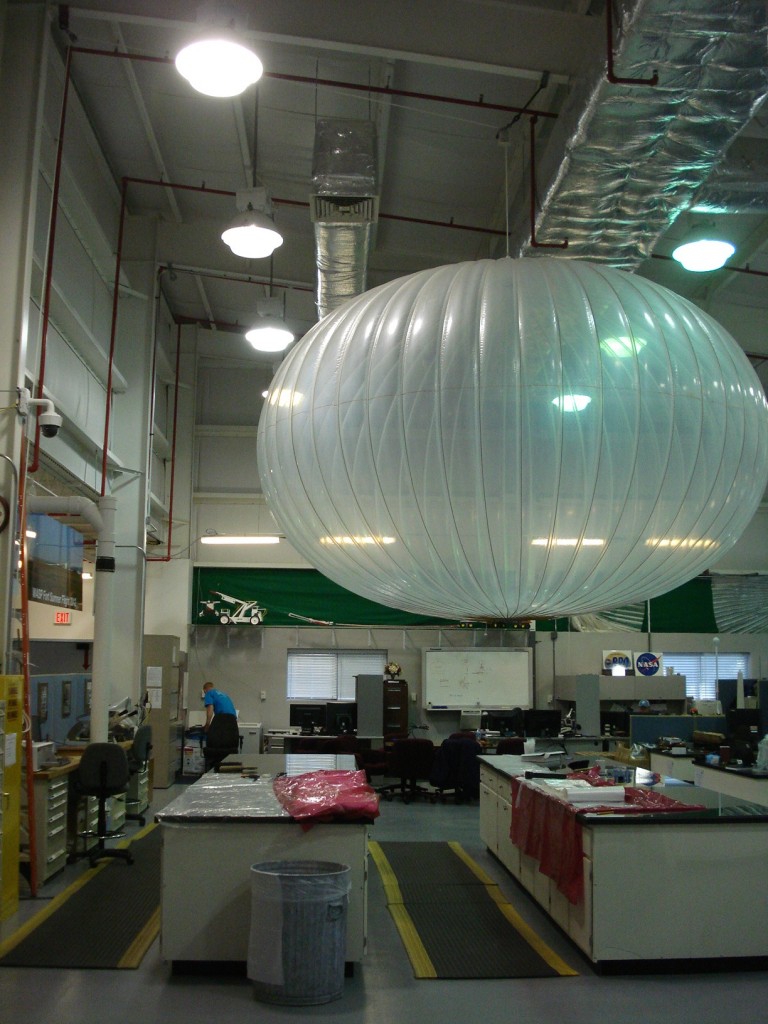
Some tour! Our first stop was with the balloon lab. There was discussion about the shortage of helium and that when it gets too expensive, they will/may have to switch back to the more dangerous hydrogen for fuel. The various materials they had on hand to construct the balloons varied in size; the largest the balloonists had built contained the approximate volume of the Astrodome.
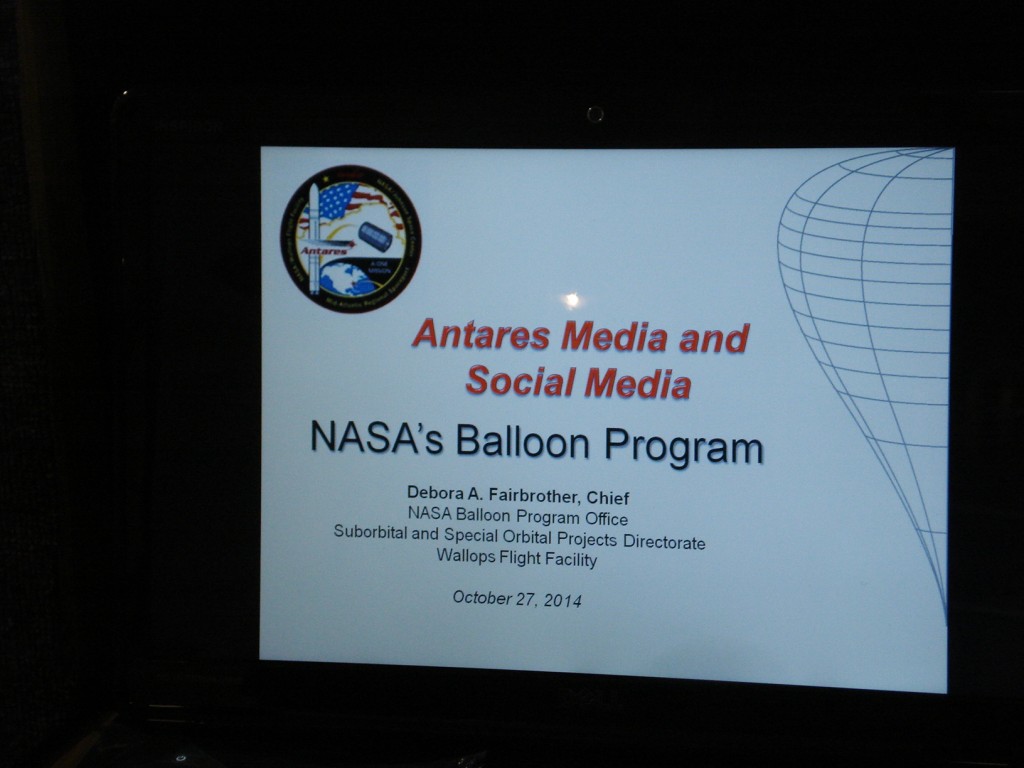
The lab itself was full of all sorts of things. Wall racks with giant rolls of Mylar and polyethelene just waiting for use.
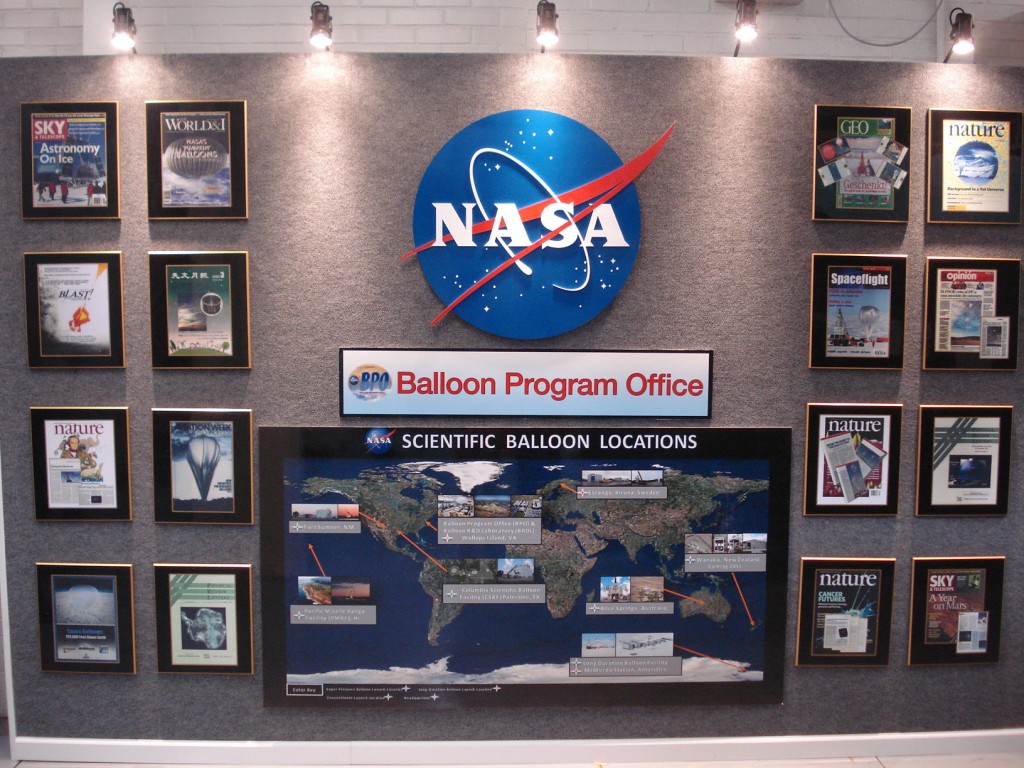
Oddly, none of us asked how the balloons are constructed. It’s obviously more involved than giving a 3rd grader a hot glue gun, some popsicle sticks, and yarn. But construction details weren’t mentioned once and I can’t believe it didn’t occur to me to ask.
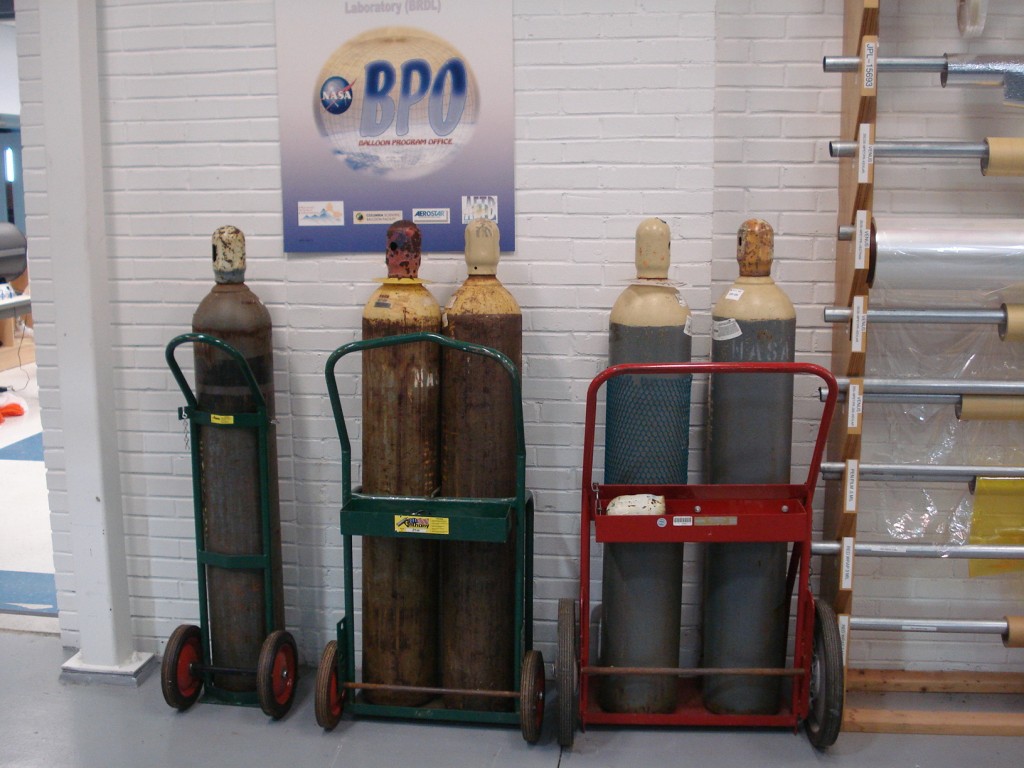
We took a look through the rest of the, well, I’m calling it balloon factory, and we went past various testing chambers, one of which was an anechoic one, no doubt to test the various electronics packages that fly aboard the different balloons. There are multiple balloon launch sites.
After getting our fill of balloons, we moved to the Sounding Rocket Foundry. I simply can’t do it justice- they perform nearly everything from raw machining to final assembly of these sub-orbital rockets. 2015 was the 70th Anniversary for Wallops, which has launched over 16,000 rockets; the name “Wallops” comes from an early English surgeon who owned much of the land in the region.
The shop checks for rocket deflection, does a BEND test, and has a giant shaker table. Sounding rockets are violent creatures- there is a lot of work that goes into the payloads, of course, but those won’t matter if they can’t get to orbit. Imagine having your tires balanced on your car- that’s, sort of, what these fine folks are basically doing. I did notice the high number of blue lab coats, which I asked about. They are used for ESD protection. Or, if it is chilly in the room.
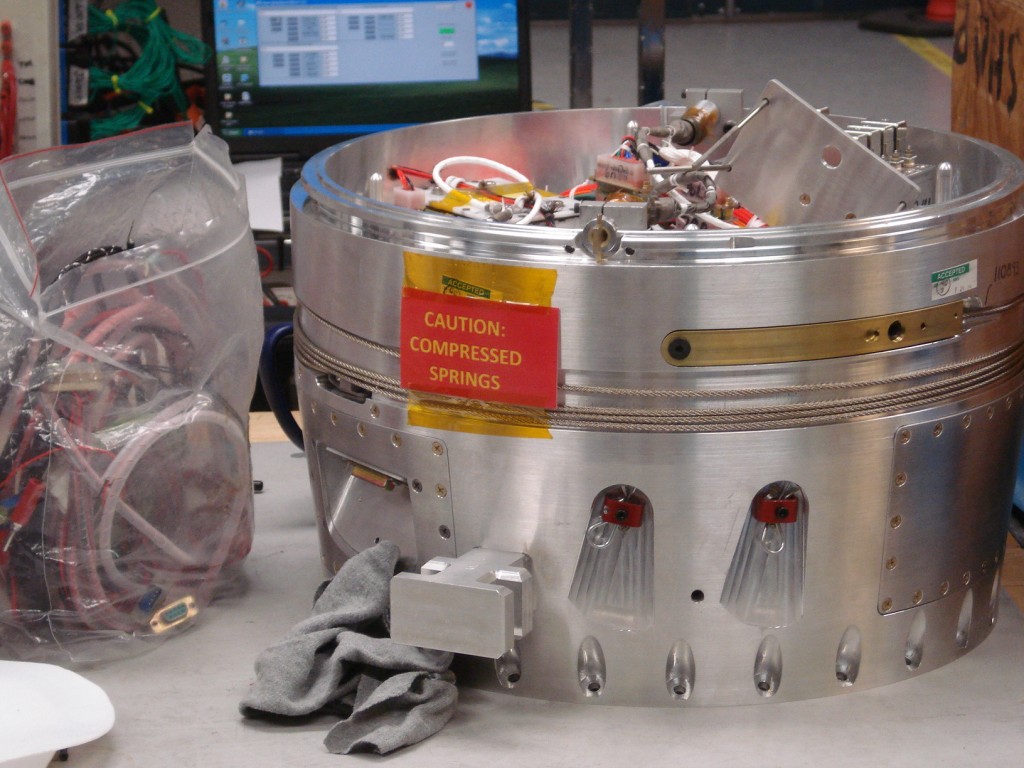
We also found out that, much like leaving a light on in a theatre to keep the evil in the dark, you don’t use the word “explode,” when you are discussing the combustion forces at work in a rocket motor. You instead say, “it makes fire.”
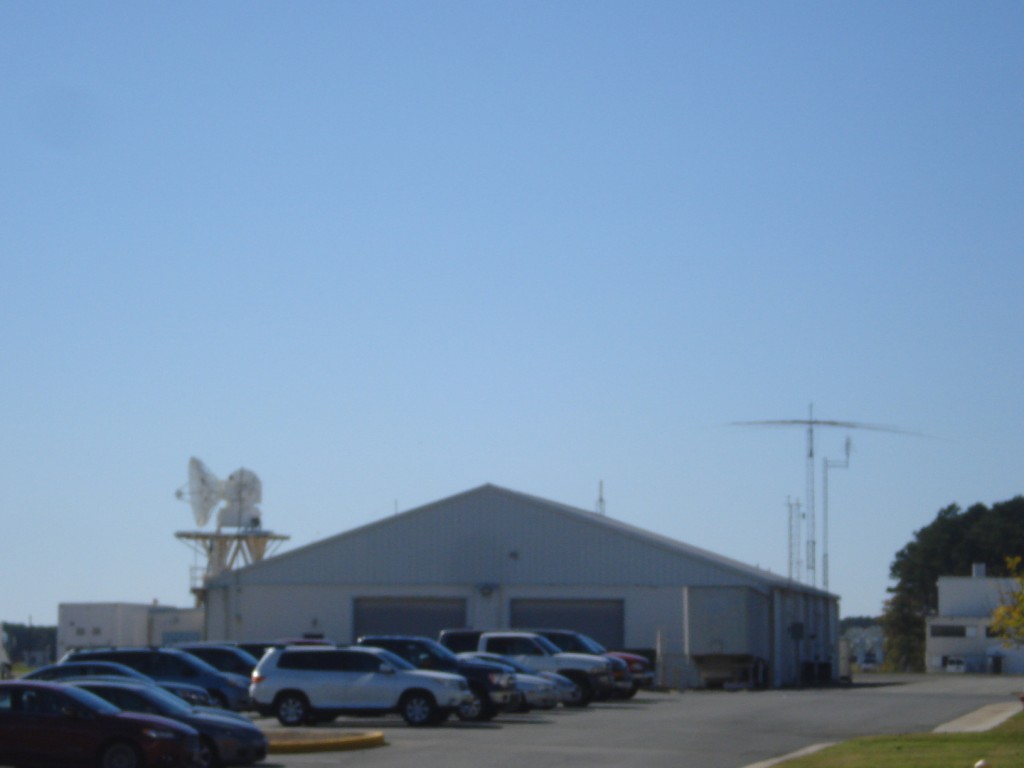
The last stop of the day before the launch was a tour of the launch command and control. It reminds one of everything we see in the media- the trenches of monitors, people running pre-flight checks, following the step by step guide that takes nearly a day or so to get through. When you are sending a rocket up- you better get everything as right as you can.
I did learn during this part of the tour that the NASA logo was affectionally called “The Meatball.”
After this last jaunt, we headed back to the visitors center, and got geared up for the night launch. Sadly, I missed it, along with everyone else. There was some boat in the downrange launch area that couldn’t be moved out of the area in time to meet the launch window. I couldn’t stay- I headed back to Atlanta on the earliest flight out the next day.
And in maybe some way, I was lucky. The next evening, the rocket had an anomalous event during launch which ended with the rocket’s destruction, along with major damage to the launch pad and associated facilities.
The #NASAsocial people who were able to stay were evacuated away, along with the other VIPs from a launch viewing area around two miles away from the launch pad. Eventually, Orbital decided that there was a defect in the rocket engine itself and have moved away from that supplier to another.
I had a wonderful time, even though I didn’t get to view the launch directly. I would encourage anyone who is interested in NASA and space in general to keep an eye out for a #NASAsocial event near you- it’s worth the trip!
Please note: in what follows, you are reading a partially fleshed out manuscript based upon experiences from nearly a year ago in regards to how the ARRL and AMSAT deal with “cub reporters,” “bloggers,” and other non-traditional media sources- I had been selected as a #NASASocial guest for the Antares Orb-3 launch at Wallops Flight Facility and was trying both to find something to link the launch to my amateur radio hobby and space nerds such as myself in general. Next month’s post will be an in depth review of that overall experience- without any focus on the groups that inspired me to sign up in the first place.
It’s entirely possible that the ARRL and AMSAT have changed their behavior in the meantime (sadly, this story will probably be sort of like Joe Taylor, sycophants et al., and his beloved WSJT- if it wasn’t invented in his mind, it can’t be worth much unless he can ride your superior coding coattails- see the recent K9AN stuff in the wsjtdevel group) but it is incredibly unlikely any change has happened at all. Sean Kutzko, KX9X, had been recently promoted (Spring/Summer 2014 or so) to deal with media requests and has continued to do a very poor professional job in handling them- yet he somehow seems quite able to announce his own DXpeditions on relevant community mailing lists. AMSAT is nearly dead, sad to say, and while it doesn’t give me any joy to throw sand upon that already dug grave, I think it is prudent to mention how cliquish, silly and irrelevant they’ve become. Wonder when AMSAT will be absorbed by ARRL?
—…— —…— —…—
10/29/14
I happen to think that the ARRL and AMSAT get most things right, if better late than never. But in this case, they both failed me.
A week before I was to leave for the launch, I emailed Kay Craige, ARRL President, requesting help about whom I should speak to in regards to any questions the ARRL might like asked and how to include any facet of amateur radio-just to keep the subject alive in present day science. And like the very class act she is, she responded with the greatest alacrity. She directed me to Sean Kutzko (ARRL) and Barry Baines (AMSAT) as sources for information on any relevant amateur radio interest that might be encompassed by the launch. Unfortunately, neither Sean nor Barry responded to my pre-flight checklist on my way out to the launch, and Sean did not respond to any emails during or after the launch. Looking back, there is the ARRL response and the AMSAT one that I would like to describe- I’ll take them in that order.
After the Antares launch failure, it came as a shock to me that the ARRL released a statement regarding the amateur radio satellite payload that had been on the manifest to be launched- especially considering I had previously asked if one was aboard, who could I speak to about it, I was going there as a #NASASocial guest and would do anything to help report, ask questions, make friends, and so forth about just such an endeavor. I’m not an expert, but it seems to me that the ARRL ignored me- and Sean Kutzko, KX9X, in particular. I had emailed him both at his professional and personal email address to seek help on anything QST might like to cover, anyone he might know who’d be there, anyone who might have a story to tell, anyone who might have a ham radio connection at Wallops, any pictures they might like, and so on. And then, when it proved beneficial to the ARRL’s relevance, the ARRL released what knowledge they did have regarding the launch in order to appear in the know. It seems to be the case that the ARRL knew there were payloads aboard; but Sean couldn’t simply lift a finger to help. Predatory journalism or business as usual? You be the judge.
AMSAT was a bit better- after I complained on Twitter the night before the scrubbed first launch attempt, Barry finally did email me back in a rather condescending way and gave the usual excuse(s) that he had simply missed the email- it was only because one of the more connected leadership actually saw and acted on the negative tweet. How a president of an organization of 3K people (or put another way- so few people), or however many they have, can simply miss an email is incredibly strange to me. In the fair spirit of not reposting his very weak answer (but you know, if his wife, his boss or his friends had emailed him, he would have had some sort of response, it seems reasonable to believe) for all to see, just please take it on faith that his response was, at best, only a placating response at his failure to have any information with which I could work with in my travels. That much was beneficial, I think- it isn’t clear to me that either of these organizations knows what is going on day to day, but rather, that they know what is going on when some sort of catastrophe happens. Barry did say that he didn’t know of any amateur radio sats going up on this payload- so it looks like the ARRL scooped him here. How much longer will it be until AMSAT folds into the ARRL? The Fox program is probably their last, due to lack of membership dues and funding. I mean, if they don’t know what’s going up on the rockets that did contain amateur gear, is it reasonable to expect they will for any other but their own? If not, why not? The answer is money, and they seem to be running out of it because the membership keeps dropping. I can only wonder why- it couldn’t be a lack of response from leadership, perhaps?
To drive the point home: search ARRL/AMSAT news archives for any mention of the Antares launch before it occurred- see how forward thinking they were. You’ll find the same answer I already knew- neither gave it any thought or mention until such as disaster could directly benefit them. Is that who you want to give your money to, the people who only ask for your money in a manufactured crisis?
So, sorry fellows, time for you to take your lumps for mediocre performance. Your less than helpful efforts should be noted both so you can improve and as a warning to others about your performance when it comes time for voting- no pay raises for Sean! Barry- investigate how to merge with ARRL and get Kay Craige onboard. She’s the best leader the ARRL has had in a generation- let AMSAT die and bring them on over.
I’ve been in the middle of a job change, and so I’ve neglected my duties here in corresponding with you, gentle reader. It doesn’t mean that I haven’t anything to say, just that I’ve not had made the time in which to say it.
I’ve been working on two separate, but related, pieces concerning my trip to Wallops Flight Facility to participate in the #NASAsocial program. One of these is strictly about the launch experience itself and what I experienced as a #NASAsocialite. The second, and what will perhaps be a bit more controversial, piece centers around my preparatory work I attempted before I even left to go- enlisting the help of the ARRL and AMSAT in helping to brief me about any amateur radio questions or protocols for being the very best ambassador to the various people I may, or may not, encounter. I’d like to give a shout out to Kay Craigie, N3KN, who actually took the time to respond to my query and point me in the right direction- she has more class in her little finger than probably exists within 1 square mile of anywhere I happen to be at the moment. But the rest of that story isn’t as upbeat, and it will possibly shed a little bit of light on why AMSAT membership in particular is declining, and why it’s probably going to eventually go the way of the dinosaur sooner rather than later.
Next month will be the sad story first- how Sean Kutzko, KX9X, missed the opportunity to get a first hand account and instead has continued to point out that satellites were destroyed in the failed launch but couldn’t be bothered to discuss this with me before the event itself (that is, it only became “news” when the launch failed). As the public media relations person for the ARRL, I was incredibly surprised at his lack of a response to a simple query. Then I’ll turn my attention to Barry Baines, WD4ASW, president of AMSAT, condescending email to me which was only written after complaining on Twitter about the lack of any help from an organization of which I was a member (I won’t be renewing) to find the people to ask and get a story, which, I don’t know, could have been published in the AMSAT Journal.
But then, the good news- why you should apply for social media credentials and participate in the #NASAsocial program. I met some really cool people, saw some very neat things, and realized that there is a great deal more science going on that, until that trip, I simply had no idea existed. While I think it’s fair to make the criticism that with amateur or armchair “journalists” you’ll end up with that sort of reporting, it would be rash to stop the discussion at that point. I met a couple of people who really used their social media chops and reached out and told a story to their audiences that may be just as good as anything else you might come across. Check out @nechton on Twitter- his pictures really told the story of the Antares #NASAsocial media experience. There are others, too- and I’ll make sure to point you to them.
Recently, I got the chance to participate as a NASA Social Media Commentator for the Antares launch from Wallops Flight Facility, VA. As you have no doubt heard, the flight did not go as expected and some, as yet to be determined, anomaly caused the vehicle to crash. It will be some time before any real reasons reveal the cause of the launch vehicle failure. So, in the meantime, please enjoy my collection of photos I’m posting of the different toolboxes and workbenches I saw around the facility on my tour.
If I learned a lesson, it’s that I need a new camera. Please enjoy the blur!
